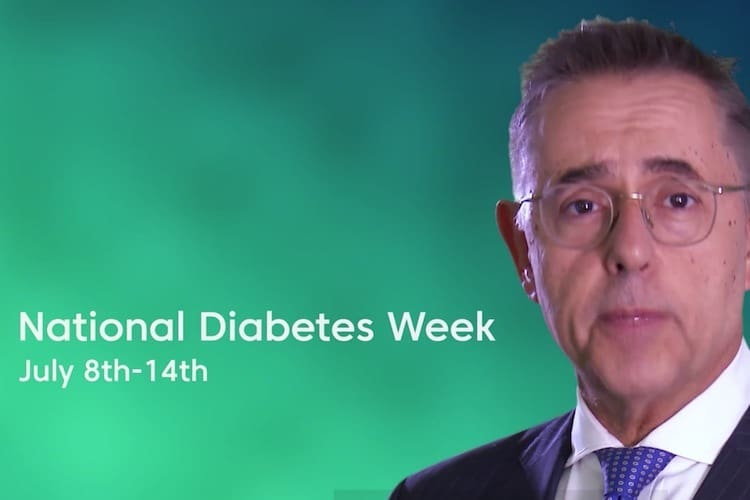Video transcript
Dr Norman Swan: Diabetes is the inability of your body to upload sugar for energy, and that’s because your body either doesn’t produce insulin, the hormone that takes glucose out of your bloodstream into cells for energy, or because your insulin doesn’t work as well as it should.
That failure to process glucose affects the entire body, damaging your blood vessels, your nerves, kidneys, eyes, and skin. For example, if diabetes isn’t well cared for, it can double the risk of heart attacks and strokes.
Now there are three types of diabetes. Type 1, which is the failure to produce insulin in the first place and needs insulin injections. Type 2 is the commonest form where insulin doesn’t work as well as it should. And then there’s gestational diabetes, which comes on during pregnancy. But let’s focus on type 2 diabetes as it counts for 85 per cent of all cases.
People who develop type 2 diabetes tend to have a life style which is inactive and have a poor diet, leading to being overweight or obese. That’s on top of carrying genes which makes you more susceptible to the condition in the first place. Some group such as Aboriginal and Torres Strait Islanders people and people of Indian ethnicity have much higher chances of developing type 2 diabetes. And what’s most concerning is that up to half a million Australians have type 2 diabetes and don’t know it, and that’s puts them at hidden but real risk of heart attacks, strokes, dementia, blindness, and kidney failure.
Michael (type 2 diabetes): The symptoms were pretty inconsequential at that stage. I was a little bit thirsty. I’d lost a tiny bit of weight, but there were no other real symptoms. So I was able to manage the diabetes by exercise, by food control, and just being careful, but I quickly learned that diabetes is a progressive disease. It doesn’t get better. It just keeps developing. The symptoms really became quite severe. I was getting headaches. I couldn’t sleep. I dropped a lot of weight very suddenly. I was thirsty in a sense that I imagine what I would be like if I was in a desert. I was never satisfied no matter what I drank. And I really needed to find out what was wrong. My GP sent me to a specialist, and they did a whole series of test and worked out exactly what was going wrong.
Dr Norman Swan: In most people, type 2 diabetes starts silently, but it’s important to be aware of early warning signs, such as if you you’re more thirsty than usual, or you’re passing more urine, feeling tired and lethargic. Do you often feel hungry? Having cuts that take a while to heal or itchy skin infections. Is your vision blurred at times? Are you putting on weight? Do you have mood swings, headaches, dizziness, or leg cramps? Go to myDr.com.au to check your diabetes risk.
Michael: I feel like I’m complaining about a first world problem, but the change to my life style is the regularity with which I have to take medication. It’s very inconvenient and it’s very easy to forget to do it when you’re first starting until you get into a routine about it. So I take both tablets, and over the last few years I am having self-administered insulin injections. I need to eat. Grazing I guess is what they refer to it as. I’m much better off if I eat 5 meals a day than I do if I have 3. If I miss out on lunch, I can guarantee that I will have very high blood sugar levels and I’ll probably get a headache in the afternoon.
Dr Norman Swan: Initially, type 2 diabetes can be treated by eating a healthy diet, losing weight, getting regular aerobic exercises, strengthening your muscles through weight training or other exercises. The more muscle mass you have, the better your insulin works. Over time you may need medication or require insulin to avoid more serious long-term complications. So it’s important to see your doctor for regular checkups and blood tests.
Michael: I think you can manage it for quite a long time as I did, but eventually it will catch up to you, and you need to understand what the implication for that are for you and your family.
Dr Norman Swan: Diabetes Week is about early detection and early treatment. If you have any of the symptoms I just mentioned, don’t delay, make an appointment with your doctor.

